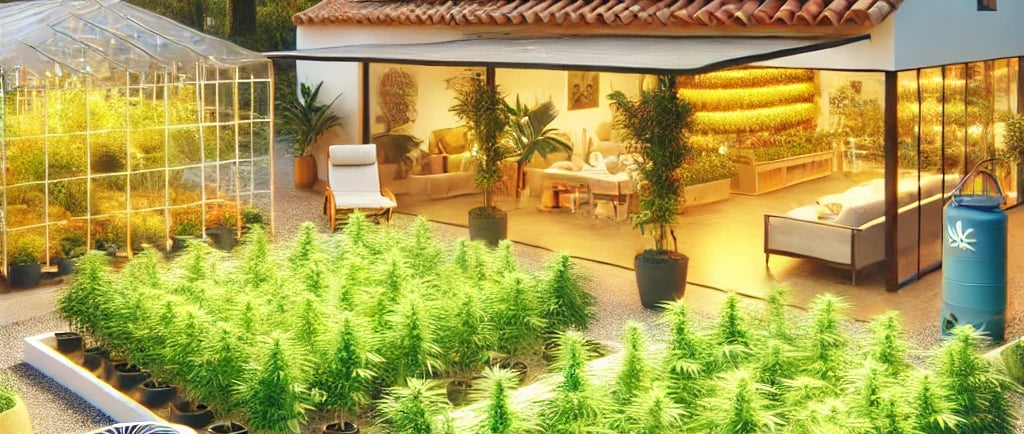The Role of Sustainability in Cannabis Clubs in 2025
As the cannabis industry grows, sustainability has become an essential focus, particularly for cannabis clubs in Spain. Known for their unique model of community-based cannabis cultivation and consumption, these clubs are increasingly integrating environmentally conscious practices into their operations. In 2025, sustainability is no longer just a trend—it is a core value that shapes the way these clubs function, from cultivation to consumption.
CANNABIS GUIDE
1/28/20252 min read


The Cannabis Club Model and Sustainability
Cannabis clubs in Spain operate under a cooperative model where members collectively grow and consume cannabis in a private, regulated setting. This model inherently supports sustainability by promoting local and small-scale cultivation, reducing the carbon footprint associated with large-scale industrial farming and international cannabis trade.
In 2025, many clubs have adopted sustainable cultivation techniques, including organic farming, water conservation methods, and renewable energy sources. These practices help reduce environmental impact while ensuring high-quality cannabis for members.
Key Sustainable Practices in Cannabis Clubs
Organic Cultivation
Many cannabis clubs now prioritize organic farming practices, avoiding chemical fertilizers and pesticides. This approach not only preserves soil health but also ensures that the cannabis consumed is free from harmful chemicals.Energy-Efficient Operations
With indoor cannabis cultivation consuming significant amounts of electricity, clubs have started adopting renewable energy solutions like solar panels. Additionally, energy-efficient LED lighting and climate control systems are now standard in most operations.Water Conservation Techniques
Water is a critical resource in cannabis cultivation. Clubs have introduced systems like drip irrigation, rainwater harvesting, and greywater recycling to minimize water usage.Waste Reduction and Recycling
From composting plant waste to recycling packaging materials, clubs are striving to minimize waste. Many have also transitioned to biodegradable packaging for their cannabis products.Sustainable Strain Selection
Clubs are increasingly cultivating cannabis strains that require less water, grow faster, and thrive in the local climate, further reducing their ecological footprint.
Community Education on Sustainability
A significant aspect of sustainability in cannabis clubs is educating members and the wider community. In 2025, many clubs host workshops, seminars, and events to raise awareness about eco-friendly cannabis cultivation and consumption. These initiatives not only strengthen community ties but also encourage members to adopt sustainable practices in their personal lives.
Collaborations and Partnerships
To advance their sustainability goals, cannabis clubs have started collaborating with environmental organizations, research institutions, and local governments. These partnerships often focus on innovation, such as developing new cultivation technologies or establishing regional sustainability standards for cannabis production.
Challenges and Opportunities
Despite these efforts, cannabis clubs face challenges in their sustainability journey. High upfront costs for renewable energy systems and sustainable farming equipment can be a barrier, especially for smaller clubs. However, government incentives and grants aimed at promoting sustainability in agriculture are helping alleviate these costs.
On the flip side, embracing sustainability offers significant opportunities. Clubs that adopt eco-friendly practices often gain a competitive edge by attracting environmentally conscious members. Moreover, sustainable operations can lead to cost savings in the long run, particularly in areas like energy and water consumption.
The Future of Sustainability in Cannabis Clubs
Looking ahead, sustainability will likely play an even greater role in the cannabis club model. Innovations in technology, such as AI-driven cultivation systems and blockchain for tracking sustainability metrics, could revolutionize operations. Additionally, as consumer awareness grows, clubs that prioritize sustainability will continue to thrive.
In 2025, cannabis clubs in Spain are setting an example for the global cannabis industry by proving that sustainability and quality can go hand in hand. Their commitment to the environment not only benefits their members but also contributes to a greener future for all.
By prioritizing eco-friendly practices, cannabis clubs are not just cultivating cannabis—they are cultivating a culture of sustainability that will have lasting impacts for years to come.
